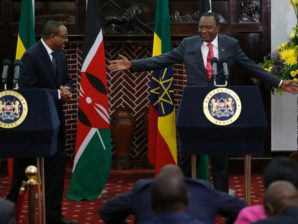
By Wanjala Danson
The Kenyan government has said it signed memorandum of understanding with the Ethiopian government with no specifics on the construction of an oil pipeline from Kenya to Ethiopia.
It was after there was confusion about the MoU after the Ethiopia ministry of Mines, Petroleum and Natural Gas denied signing of a formal agreement on constructing a pipeline, contradicting an announcement on the matter by State House in Nairobi last month.
The Foreign Affairs Cabinet Secretary Amina Mohamed has stated that the agreement signed by Kenya and Ethiopia was on supplement the existing cooperation between the countries, including a memorandum of understanding on the entire energy sector.
“The two countries expressed a desire to advance the mutual benefit that the parties can draw by cooperating in the oil and gas sector,” she said.
The ministry of Energy and Petroleum Kenyan told the Sun Weekly that the ministry signed the MoU on gas with his Ethiopia counterpart.
“The Cabinet Sectary for Energy and Petroleum and his Ethiopian Counterpart signed a Memorandum of Understanding (MOU) on oil and gas,” stated Eunice Muthamia from public communication department in the ministry.
“The progress on the Lokichar-Lamu Crude Oil Pipeline; Expression of Interest (EOI) for Front End Engineering Design (FEED) has already been done and preparation for Request for Proposal (RFP) is currently underway,” she added.
This include a MOU where the two countries will exchange information and ideas on oil and gas laws, policies, institutional framework, agreements among other regulatory framework.
The Reporter, an Ethiopian newspaper reported last week that an oil pipeline deal Ethiopia government signed with Kenya was only a commitment by both sides to assess the feasibility of the project.
“We did not sign a pipeline construction deal,” stated the minister, Tolossa Shagi told the Reporter.
“We have agreed to take some time to assess the matter. We will hold more talks and may ink a deal if we find the project proposal economically and technically sound. But I can confirm to you that we did not sign a pipeline construction agreement” he added.
He stated that Kenya presented the idea of a pipeline to his government, with Addis Ababa agreeing to assess its potential before committing to constructing it.
However, the information contradicted State House announcements when Ethiopia’s Prime Minister Hailemariam Desalegn visited Nairobi late last month which stated Kenya and Ethiopia signed a new deal on construction of an oil pipeline.
The deal is on the Lamu Port-South Sudan-Ethiopia Transport (Lapsset) project launched in 2012, which include linking roads between the two countries, an international airport in Isiolo town and a sea port in Lamu.
Kenya was to go for the construction of Lapsset alone after Uganda opted for Tanzania for its oil pipeline route and Rwanda also opted to use the Tanzania route for its standard gauge railway for transport projects.
The two countries argued it would be expensive to build through Kenya and also the issue of guaranteeing security arose.
The Kenyan and Ethiopian leaders signed five agreements on energy, animal health, education and sports said the commitment to Lapsset is still strong and vowed to speed up the construction.
The Kenyan media reported that an oil pipeline construction agreement was signed by Prime Minister Hailemariam and the Kenyan president Uhuru Kenyata.
According to the media report, the proposed pipeline would run all the way from Lamu to Addis Ababa.
However, the minister said that the government of Ethiopia agreed to evaluate the proposal thoroughly and may sign the deal by the end of 2016 if the proposal is economically and technically sound.
“Kenya has discovered oil reserves in different parts of the country. So we agreed to work on experience sharing and training. We signed an oil and gas cooperation agreement,” he said.

Leave Your Comments